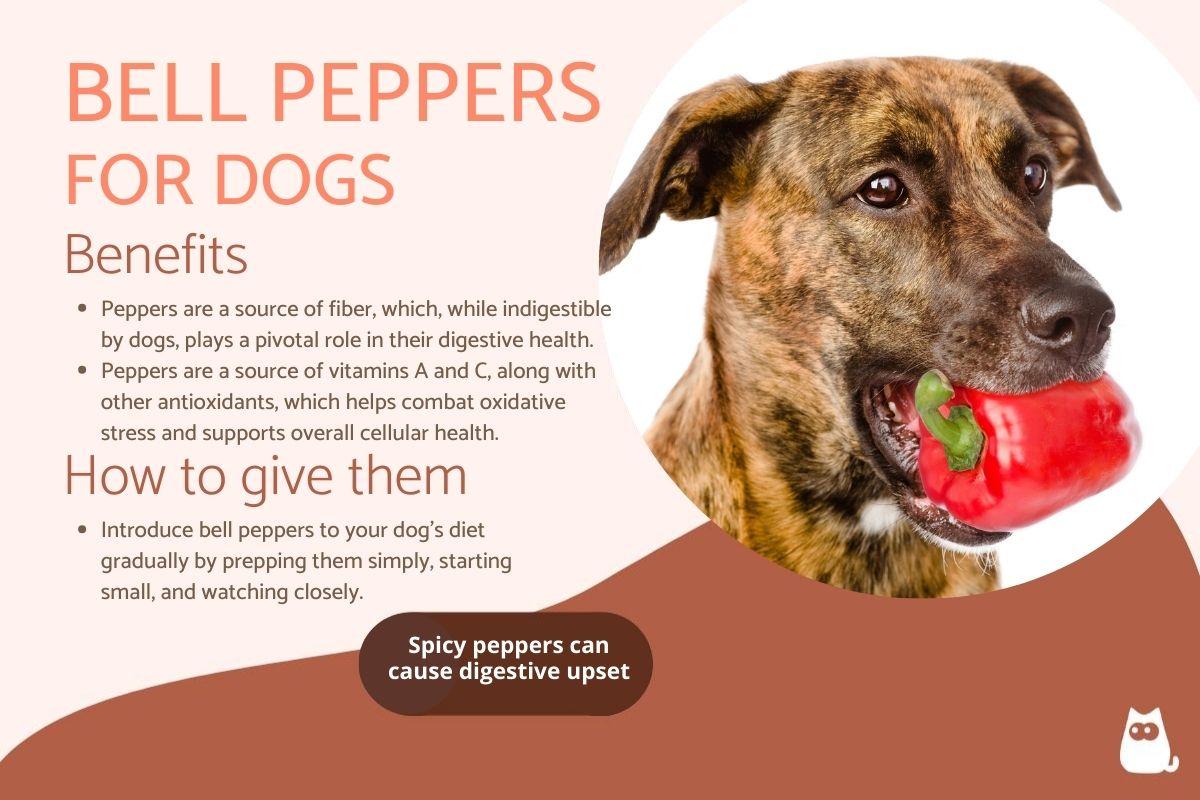Are Bell Peppers Safe for Dogs to Eat?



See files for Dogs
Bell peppers, with their vibrant colors and crisp textures, are not only a visually appealing addition to your kitchen but also a versatile and nutritious treat for your canine friend. These colorful vegetables offer a wealth of essential nutrients, including vitamins A, C, and K, fiber, and potassium. While they are generally safe for dogs to consume, it's important to introduce them carefully and in moderation.
The following AnimalWised article explores if bell peppers are safe for dogs, their nutritional advantages, recommended dosage, and potential contraindications.
Can dogs eat bell peppers?
Yes, dogs can eat bell peppers. In fact, they are a healthy and nutritious snack for dogs, and they come in a variety of colors, each with its own unique flavor and nutritional profile.
- Green bell peppers are the least sweet of the bell peppers, but they are still a good source of vitamins and minerals. They are also a good source of fiber, which can help to regulate your dog's digestion.
- Yellow bell peppers are sweeter than green bell peppers, and they are a good source of vitamin C. They also contain lutein and zeaxanthin, which are antioxidants that can help to protect your dog's eyes from damage.
- Orange bell peppers are the sweetest of the bell peppers, and they are a good source of vitamin A. They also contain beta-carotene, which can be converted into vitamin A in the body. Vitamin A is important for maintaining healthy skin and vision.
- Red bell peppers are also a good source of vitamin A, and they are even sweeter than orange bell peppers. They also contain lycopene, which is an antioxidant that can help to protect your dog from cancer.
Keyly, these vegetables are free of any harmful substances for dogs, making them a nutritious and safe addition to their dietary regimen.
Are all peppers safe for dogs?
While peppers offer a range of nutritional benefits for dogs, it's crucial to distinguish between suitable and unsuitable varieties.
As mentioned before, bell peppers, such as red, orange, yellow, and green varieties, are generally safe for canine consumption and provide a rich source of vitamins A, C, and K, fiber, and potassium.
However, caution is advised when introducing spicy peppers like jalapeños, chili peppers, and habaneros into your dog's diet. These peppers' intense spiciness can cause digestive upset, gastrointestinal distress, and even toxicity in dogs.
Are bell pepper leaves toxic to dogs?
Bell pepper leaves are not toxic to dogs, but they are not particularly nutritious either. They contain a high concentration of oxalates, which can bind to calcium in the body and form kidney stones. Additionally, the leaves are difficult for dogs to digest.
If your dog accidentally eats bell pepper leaves, they are unlikely to experience any serious health problems. However, it is best to avoid feeding them bell pepper leaves intentionally.
Benefits of bell pepper for dogs
Integrating peppers into your dog's diet can unveil a wealth of nutritional benefits, ranging from weight management to immune system support. Here's a comprehensive overview of the key advantages:
- Lean and light: peppers, with their low calorie and fat content, make them an ideal choice for dogs on weight management or maintenance plans, particularly for those prone to obesity or senior canines.
- Rich in fiber: red peppers stand out as a significant source of fiber, which, while indigestible by dogs, plays a pivotal role in their digestive health. It adds bulk to meals, promotes satiety, encourages the growth of beneficial gut flora, and regulates bowel movements.
- Vitamin C: green peppers are packed with vitamin C, a potent antioxidant that reduces oxidative stress, supports collagen production for healthy skin and joints, and contributes to bone formation. It's crucial to consume peppers raw to preserve their vitamin C content, as cooking can significantly diminish it.
- Vitamin A: red peppers, rich in beta-carotene, exhibit significantly higher vitamin A levels compared to green peppers. Vitamin A is essential for various bodily functions, including vision, keratinization, maintaining skin and mucous membrane integrity, strengthening the immune system, and supporting reproductive health.
- Diverse mineral profile: peppers offer a diverse array of minerals, with potassium taking center stage and lesser amounts of iron, phosphorus, and magnesium. Notably, red peppers reign supreme in terms of nutritional value, while yellow peppers hold the least nutritional significance. When selecting peppers for your canine companion, consider these nutritional variations.
- Antioxidant properties: the presence of vitamins A and C, along with other antioxidants in bell peppers, helps combat oxidative stress and supports overall cellular health in dogs.
- Hydration: bell peppers have a high water content, contributing to hydration, especially in dogs who may not consume enough water from their bowl.
Protect your furry friend from harmful treats and discover the list of forbidden fruits and vegetables for dogs in our comprehensive guide.
How can bell peppers be safely incorporated into a dog's diet?
Bell peppers can be a nutritious and healthy treat for dogs when introduced safely and in moderation. Here are some tips for safely incorporating bell peppers into your dog's diet:
- Start slowly and observe your dog's reaction: begin by giving your dog a small piece of bell pepper to assess their tolerance. If they experience any digestive upset or other adverse reactions, discontinue feeding them peppers.
- Remove seeds and stems: the seeds and stems of bell peppers contain small amounts of a compound called solanine, which can be harmful to dogs in large quantities. To minimize the risk of solanine ingestion, carefully remove the seeds and stems from the peppers before feeding them to your dog.
- Cut into bite-sized pieces: cut the bell peppers into small, bite-sized pieces to prevent choking hazards. This also makes it easier for your dog to chew and digest the peppers.
- Serve them raw or lightly steamed: raw bell peppers offer the highest nutritional value, as cooking can reduce the vitamin C content by up to 50%. However, if your dog prefers cooked peppers, lightly steam them to retain some of their nutrients.
- Monitor your dog's overall diet: while bell peppers provide valuable nutrients, it's crucial to feed them in moderation. Don't replace your dog's regular kibble or wet food with bell peppers alone. Consider bell peppers as an occasional treat to supplement their diet.
- Consult your veterinarian: if you have any concerns about introducing bell peppers into your dog's diet or if your dog has any underlying health conditions, consult your veterinarian for personalized advice.
Dive deeper into your dog's nutritional needs by exploring our article on recommended fruits and vegetables for canines.
How much bell pepper can a dog eat?
The safe amount of bell peppers that a dog can eat depends on their size and breed. Here are some general guidelines:
- Extra-small dog (2-9 kg; 5-20 pounds): 1-2 small pieces (about 1 tablespoon total)
- Small dog (10-13 kg; 22-29 pounds): Less than ¼ bell pepper (3-4 small pieces)
- Medium dog (14-22 kg; 31-48 pounds): ¼ bell pepper (up to 8 small pieces)
- Large dog (23-40 kg; 51-88 pounds): ½ bell pepper or less
- Extra-large dog (41 kg+; 90 pounds+): ¾ bell pepper or less
Although incorporating bell peppers into your dog's diet can be a nutritious choice, overfeeding large amounts may result in stomach upset, diarrhea, or vomiting. If your dog experiences any adverse reactions after consuming bell peppers, it is advisable to discontinue feeding them this particular vegetable.
Contraindications of pepper in dogs
As previously noted, dogs can safely consume bell peppers as they boast good nutritional value without containing any harmful substances. However, there are instances where adding bell peppers to a dog's diet may be detrimental:
- Dogs with food allergies: for dogs with known food allergies, it is crucial to avoid introducing any foods outside of their regular diet, typically consisting of feed with hydrolyzed proteins.
- Dogs with chronic gastrointestinal diseases: dogs diagnosed with chronic gastrointestinal conditions such as inflammatory bowel disease (IBD) should exercise caution when introducing new foods. Comprehensive information on symptoms and treatment for Inflammatory Bowel Disease in dogs can be found here.
- Dogs with sensitivity to dietary changes or food intolerances: dogs with a delicate digestive system that reacts strongly to changes in their diet or those with food intolerances may struggle to assimilate certain nutrients. In such cases, it's advisable to be mindful of introducing new foods, including bell peppers, and monitor their response carefully.
Looking for more insights into your dog's nutritional needs? Dive deeper into the world of dog food allergies in our informative article.
If you want to read similar articles to Are Bell Peppers Safe for Dogs to Eat?, we recommend you visit our Homemade diets category.
- Ministry of Agriculture, Fisheries and Food. Bell pepper . Available at: https://www.mapa.gob.es/es/ministerio/servicios/informacion/pimiento-morron_tcm30-102387.pdf
- Ministry of Agriculture, Fisheries and Food. Italian pepper . Available at: https://www.mapa.gob.es/es/ministerio/servicios/informacion/pimiento-ita_tcm30-102706.pdf
- European Federation of Pet Food Manufacturers. (2017). Nutritional guides for complete and complementary dog foods.





